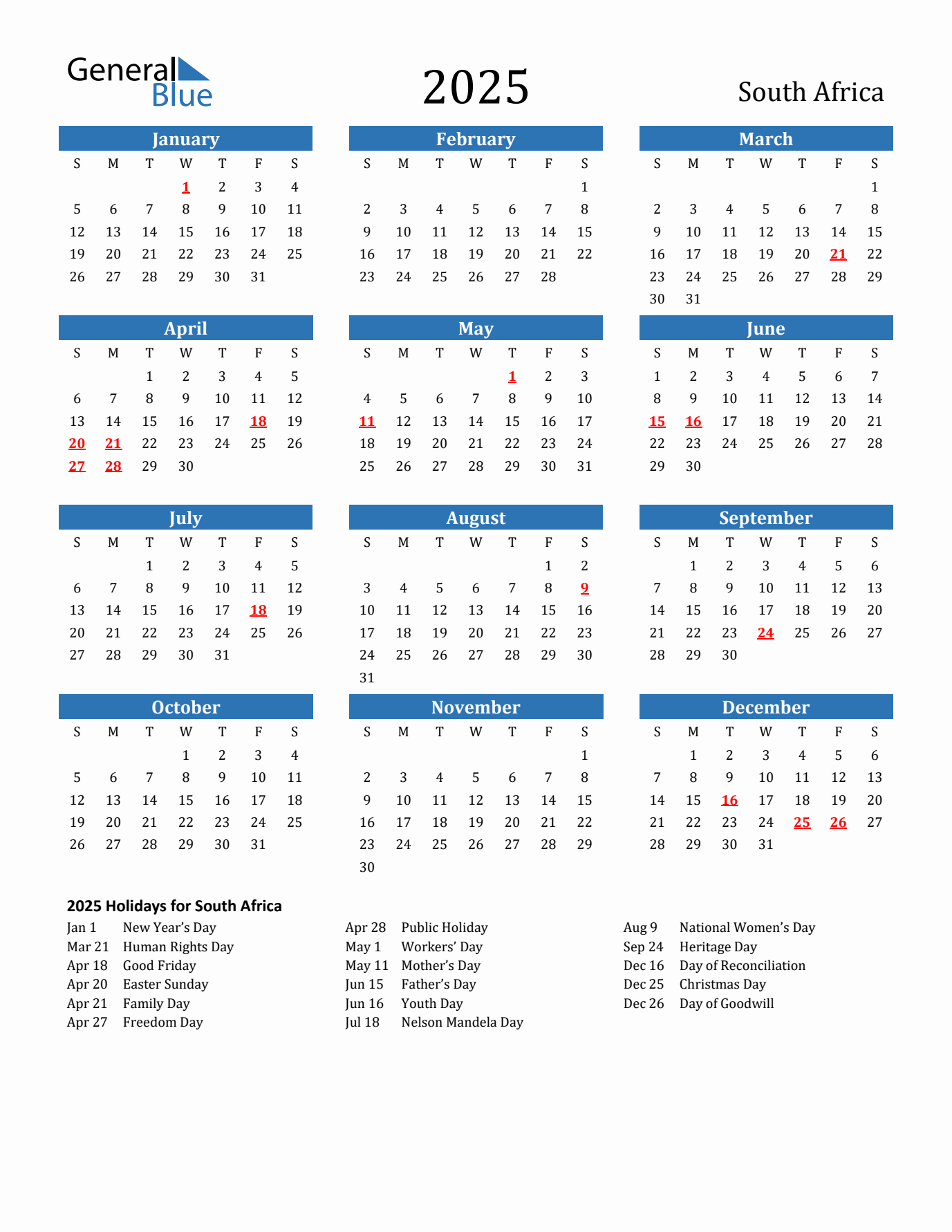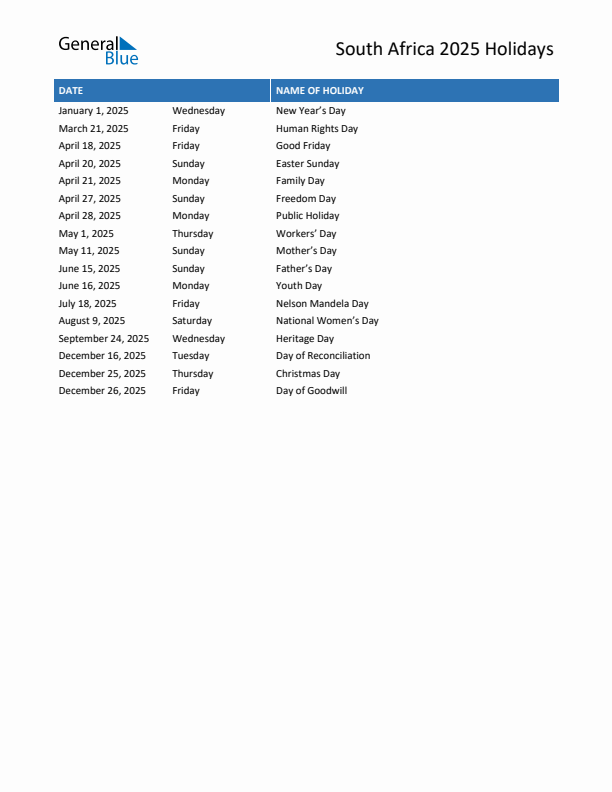Human Rights Day in South Africa
When is Human Rights Day in South Africa?
Human Rights Day in South Africa is on March 21, 2026. It falls on Saturday.
How many days until Human Rights Day in South Africa?
There are 337 Days left until Human Rights Day in South Africa.
Is Human Rights Day a public holiday in South Africa?
Human Rights Day is a public holiday celebrated in South Africa every 21st of March every year. The holiday is observed to commemorate the day when the Sharpeville massacre occurred.
The Sharpeville massacre is an incident in the past (took place on March 21, 1960) where thousands of non-white South Africans gathered in the police station of the mentioned place, to peacefully protest against the country’s Apartheid system (Apartheid is a government system where a segregation in the society is made based on race). Nevertheless, the peaceful campaign resulted in a brutal way which caused the death and injuries of many black people. Thus, when Nelson Mandela took the country’s Presidential office in 1994, he declared the 21st of March as a holiday to honor those who lost their lives and those who struggled to fight for the people’s equality and freedom.
Human Rights Day Origin in South Africa
Human Rights Day is the holiday which reminds the South Africans how trying their former years are. Before the Afrikaners (or South Africans) were granted the human rights they are currently enjoying, the South Africans (especially the non-white population), have suffered many terrible things in the past. In the year 1948, a system called Apartheid was instituted in South Africa.
Apartheid is a government system wherein a segregation was made based on race. Majority of the Afrikaners are black people, however, during the rule of the Apartheid system, these black majority were controlled by racist laws enshrining white supremacy. During this time, the basic form of human rights is clearly non-existent when it comes to the non-white Afrikaners. Their education, work, residence, marriage, and many other things, are being controlled by the laws that embody the Apartheid policies. This system has placed the white minority above the black majority. Pass laws are even implemented which made life more difficult for the black South Africans.
Pass Laws are the laws executed to restrict the movements of the black Afrikaners. With these laws, they are required to bring passes (passbook/ reference book) or identification papers anywhere they go. Failure to do so is even punishable by law. During this period, there is clearly an unfair treatment between the white and the black South Africans. The black population aren’t granted the same rights enjoyed by the white minority. Instead, their movements are restricted, they aren’t allowed to marry someone from the white race, they aren’t permitted to set up businesses in white areas, and their place of residences are even decided by the government.
The Sharpeville Massacre leading to Human Rights Day
Because of this racial discrimination, many non-whites have embarked on protests against the Apartheid system. And while several protests have risen in many townships in the country (e.g. Langa, Soweto, and others), the most notable is the one held at Sharpeville, South Africa. On March 21, 1960, thousands of people (from children, to elderly men and women) had gathered in the police station of the township of Sharpeville to peacefully protest against pass laws (laws which restrict the movements of the black population). However, the peaceful campaign ended in the most horrible way possible. The police on the mentioned area have gunned down the protesters, resulting to the death of 69 people and injuring 180 others. This incident (which was later referred to as the infamous Sharpeville massacre) ignited the hearts of many non-white Afrikaners to continue seeking liberty from the Apartheid policies. Although the South African government had tried to suppress the different organizations aiming to change the system, the movements of the black people had continued to grow across the country. These protests made by thousands of non-whites eventually led to the establishment of the South African’s Bill of Rights years later (1993), which now protected the rights of every citizen in the country, regardless of race.
When Nelson Mandela (one of the protesters to fight against the Apartheid policies), the first ever black South African President took office in 1994, it finally ended the ruling of the country’s Apartheid Government. Under his governance, he declared the 21st of March to become a national holiday in commemoration of the Sharpeville massacre. The holiday was established with the purpose of encouraging the South Africans to reflect on the sacrifices made by those who risked their lives and those who died in the past so that the current liberty enjoyed by the people could be attained. The holiday was named ‘Human Rights Day’ and was first observed in South Africa on March 21, 1966. Since then, the holiday has been celebrated in the country every year up until the present times. Due to Nelson Mandela's contribution in ending the Apartheid System, he is also recognized for his legacy and such observance is called Nelson Mandela Day.
Human Rights Day Traditions in South Africa
Human Rights Day is one of the most important holidays to be celebrated every year in South Africa. With the holiday’s observance, the South Africans are encouraged to look back on the happenings of the country’s history and all the struggles the black people have been through to get to where they are now.
For the sake of achieving the rights currently enjoyed by all, the black people in the past have endured many sufferings, had been a subject to countless injustices caused by the Apartheid policies, and had been through multiple battles to fight racial discrimination. Several of the black Afrikaners even lost their lives while fighting for freedom against the oppression caused by their white leaders. Hence, in the current times, when the holiday is celebrated, many events are held by the local governments and communities in honor of those who struggled and made sacrifices to obtain the freedom enjoyed by the current South African society. The country’s public and private organizations which focus on promoting human rights also arrange these types of events to celebrate the holiday. The people are requested to attend such events to appreciate the heroes who have fought in the past in the name of liberty.
Visiting Museums
Visiting the country’s museums and galleries is another way of celebrating Human Rights Day. The people are also encouraged to visit such places to expand their knowledge on the country’s history. On this day, majority of South Africa’s museums and galleries offer free admission to the public. Thus, it is expected for these places to get extremely crowded during the celebration. Some of the museums offering free entrances during Human Rights Day are the following: Bo-Kaap Museum, Transport Museum, Roodepoort Museum, Museum Africa, Geology Museum, South African National Gallery, South African Museum, Social History Centre, and Maritime Centre.
Water-Related Activities
While many South Africans partake on the activities mentioned above, several others take advantage of the holiday to unwind instead. Going to the beach is an example to that. Doing water-related activities such as swimming, snorkeling, diving, boat-riding, and others are observed by many people on this day. Since the World Water Day occurs the day after the country’s Human Rights Day (since 1993, World Water Day is held every 22nd of March every year), some localities would even arrange for a beach clean-up on Human Rights Day. Thus, the beaches are typically the go-to places to spend the holiday.
Other Popular Activities
For others (especially those families with kids), if a beach holiday is not appealing enough, the theme parks or amusement parks is another destination to take. Some also choose to stay at home. They prefer to chill and relax at home while enjoying the company of their loved ones. The holiday doesn’t have any traditional practices associated with it; hence, its celebration is directly dependent on each family’s take on it. One can choose to attend the events held by the local government and communities to celebrate it or take the holiday as one where you can spend some quality time with your family and friends.
At present, during the holiday’s observance, government institutions, schools, and the general offices (e.g. banks, post offices, insurance, etc.) are expected to be closed. And although many company offices also cease operation to give the employees a day off, most of the shops, shopping centers, supermarkets, museums, tourists destinations, and other establishments, choose to stay open to cater the public.
| Year | Date | Day | Holiday |
|---|---|---|---|
| 2026 | March 21 | Saturday | Human Rights Day |
| 2027 | March 21 | Sunday | Human Rights Day |
| 2028 | March 21 | Tuesday | Human Rights Day |
| 2029 | March 21 | Wednesday | Human Rights Day |
| 2030 | March 21 | Thursday | Human Rights Day |
| 2031 | March 21 | Friday | Human Rights Day |
| Holiday | Date |
|---|---|
| Good Friday | April 18, 2025 |
| Easter Sunday | April 20, 2025 |
| Family Day | April 21, 2025 |
Download or print free 2025 calendar which includes the list of holidays in United States. Free holiday calendar templates in more than 130 countries are provided in PDF, Excel, and Microsoft Word format. For those who like to get a calendar that starts on Monday, we also have ISO calendar.
The April 2025 monthly calendar for the United States shows the holidays for the month, which is helpful in planning schedule and events in reference to the upcoming holidays in the US. It is available in PDF, Microsoft Word and Microsoft Excel formats. You may select your preferred orientation and preferred start of week since we have Monday start calendar or Sunday start calendar.
If you are looking for just a list of holidays in the United States for the year 2025, we have that available in PDF, Word and Excel formats. This can be helpful for those who like to keep track of the holidays, be it for travel, work or any other purposes. It is free to use, just like the rest of our templates. You can choose from Letter, Legal and A4 paper sizes.


